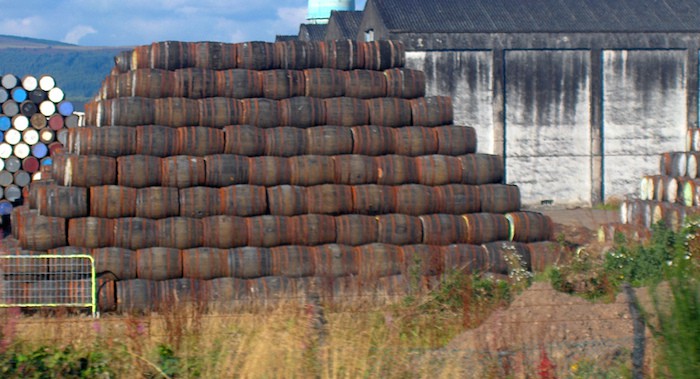If you’ve pondered whether your favorite spirit will feel the impact of climate change in the near future, you’re not alone. The Scotch Whisky Association (SWA), the trade association for the Scotch whisky industry formed to “advance the global interests and profile of Scotch Whisky in forums of discussion that include sustainability and maintaining the integrity of the spirit,” has assumed responsibility to fight whatever effects may come from warmer and harsher weather.
In 2011, as part of the UK Climate Impacts Programme, The SWA commissioned the Scotch Whisky Research Institute (SWRI) to deliver a “scoping study” that assessed the risks of climate change to the Scotch sector and identify “initial adaptation options,” according to the Climate UK website. Afterwards, the SWA held an industry workshop to raise awareness of climate change impacts and adaptation within the scotch industry. The hope was that everyone in the business could share information and experience to generate ideas that the SWA and SWRI could utilize in dealing with the imminent and growing concerns.

“We take sustainability and the environment very seriously and have an ambitious and far-reaching Industry Environmental Strategy,” said Rosemary Gallagher, Head of Communications for the SWA. Of course, environmental threats stand to impact the not only the quality of whisky production, but the entire landscape of the rich resources that make the area unique.
As it stands, Scotland is already experiencing several vulnerabilities to its whisky production, which include:
- Lower river flow for water sources
- Raised summer temperatures that have elevated overall water temperatures, making spirit production less efficient
- Reduced snowfall in some areas, which impacts groundwater “recharge” and affects water sources
- Increased snowfall in other areas, disrupting warehouse integrity and operational issues
- Higher tides and stormier seas, which impact ferry service to island producers who face supply and shipping issues
- Grain price variability and peaks which have been partly caused by climate-related issues (i.e. droughts) create market uncertainty for distilleries.
In studying the current climate-related issues, the SWA has been able to identify the biggest threats to future Scotch production, including, but not limited to, the following:
- Supply and quality of grains, especially barley. Anticipated changes in precipitation, flooding, drought and plant disease will directly impact distillers
- The timing of heavy rainfall and gradual disappearance of spring snow-melt could affect the quality and quantity of burn and reservoir water
- Droughts will lead to regulation in water use, which may prohibit abstraction for process and cooling
- Higher water temperatures will reduce the efficiency of cooling
- The traditional processes of malting, distilling and maturing whisky, which have evolved during a “more or less stable climate” over the last several hundred years, are temperature sensitive and susceptible to permanent climate change
- More extreme, short term weather events will have a significant local disruptive effect on the entire Scotch Whisky sector
Thus, climate change poses a serious threat to meeting the global Scotch supply under the existing water structure.It’s maddening to think that the institution of Scotch distillation, arguably the most steadfast of spirits, will be forever altered, potentially in our lifetimes. This is precisely why the mission and work of the SWA and SWRI is increasingly important.
The climate change trend also calls into question what contributions whisky producers are making to mitigate these effects. Diageo, the multinational drinks giant responsible for at least 24 Scottish whisky brands, failed to meet seven out of eight of its environmental targets to cut pollution and waste as of 2015 according to Scotland’s The Herald. As a huge contributor to waste water pollution, Diageo has arguably caused itself lots of problems in the long-term, but also highlights the difficulties in balancing demand with environmental responsibility.
Obviously, Scotland faces impacts of climate change caused beyond the country’s control. Carbon emissions generated in other parts of the world impact the weather of the North Atlantic. So, while the efforts of the SWA must be applauded, certainly a global effort to preserve the integrity and stability of scotch production is needed. Soon.









